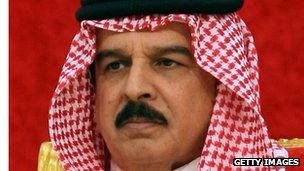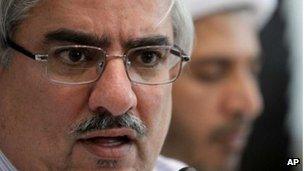Is Bahrain on road to reform?
- Published

Bahraini King Hamad committed to reform?
King Hamad of Bahrain seems to be wasting little time in pushing to implement key recommendations of a report into human rights abuses earlier this year.
The king has pulled together a committee that met for the first time in the capital city Manama.
The committee is the king's response to a report by an international panel of human rights experts. But many in opposition, sceptical of the government's true intentions have declined to attend.
The gulf island kingdom, ruled by the Sunni Al Khalifa family has been wracked by protests predominantly from the Shia Muslim community.
Shia leaders say they have been discriminated against for years. And many activists hold little hope that the king's committee will resolve their grievances and lead to genuine reform.
'Inside the tent'
One who hasn't given up hope is Abdullah al-Durazi. He was the secretary general of the Bahrain Human Rights Society (BHRS) but quit the post earlier this week after his acceptance of the king' s invitation to join the committee provoked an outcry among some of his society's members.
"Now is the time to push forward and to do that we need to be inside the tent," he told the BBC.
The committee was set up following the release of an exhaustive report into allegations of excessive use of force in the quelling of anti-government demonstrations in February and March that saw at least 35 people die.

Ibrahim Sharif, the jailed leader of Wa'ad
The commission headed by the distinguished human rights expert Cherif Bassiouni found credible evidence of the torture in custody of activists who were rounded up in their hundreds.
The Bassiouni report called for the establishment of a group that would bring government supporters and the opposition together in order to implement reforms.
Boycotts
However key political societies like Al Wefaq and Wa'ad are boycotting the committee.
Munira Fakro of Wa'ad described the committee as "expensive window dressing."
"If they were sincere they would try and find out who gave the orders to shoot," she said before asking, "Will the king and the royal family do that?"
Abdullah Durazi believes the king is serious in wanting to push for reform. But many in the opposition in Bahrain do not agree.
Asked if he sees his involvement as a gamble, he replied: "Life is a gamble - 40% inside is better than 0% outside."
One gesture of reconciliation was the dropping of charges against 100 athletes who had participated in protests.
Bahrain News Agency said late Wednesday the king officially "forgave" the athletes who insulted him.
Wa'ad leader Ibrahim Sharif remains in jail. He was convicted and given a five year sentence on several charges, including one of attempting to overthrow the government. The charges are widely criticised. His family say he was tortured while in custody.